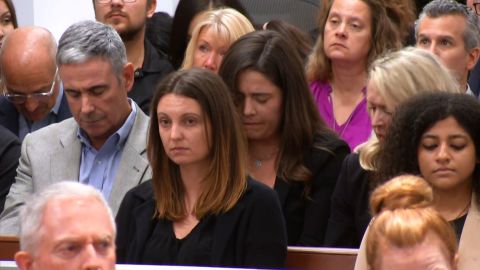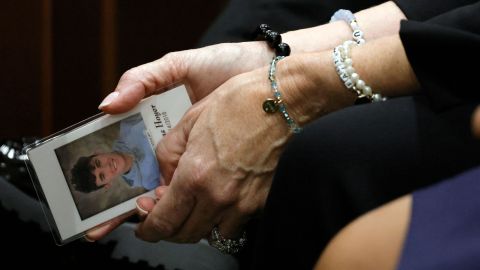[ad_1]
Fort Lauderdale, Florida
CNN
—
The Parkland school shooter avoided the death penalty after a jury recommended he be sentenced to life in prison without the possibility of parole for the February 2018 massacre at Florida’s Marjory Stoneman Douglas High School — a move that disappointed some of the victims’ loved ones. And anger.
Thursday’s jury’s recommendation to sentence Nikolas Cruz after a months-long trial is not an official sentence; Broward Circuit Judge Elizabeth Scherer is expected to issue the gunman’s formal sentencing on Nov. 1. However, under Florida law, she cannot deviate from the jury’s life sentence recommendation.
Families of the gunman’s victims nodded or shook their heads as the verdict forms for each of the 17 people he killed were read in court Thursday morning. The jury found that the aggravating factors presented by state prosecutors did not outweigh the mitigating circumstances — aspects of Cruz’s life and upbringing that attorneys said warranted only a life sentence.
None of the judges looked in the direction of the victims’ families as they read their verdicts, instead looking down or straight ahead. Cruz — flanked by his lawyers, wearing a blue and gray sweater, a collared shirt and glasses — sat expressionless, staring at the table in front of him.
LIVE UPDATES: Jury reaches verdict in Nikolas Cruz’s sentencing trial
The 14 students killed were: Alyssa Alhadeff, 14; Martin Duke Angiano, 14; Nicholas Dworet, 17; Jaime Guttenberg, 14; Luke Hoyer, 15; Kara Loughran, 14; Gina Montalto, 14; Joaquin Oliver, 17; Alina Petty, 14; Meadow Pollack, 18; Helena Ramsey, 17; Alex Schachter, 14; Carmen Schentrup, 16; Peter Wang, 14.
geography teacher Scott Biegel, 35; wrestling coach Chris Hickson, 49; Assistant football coach Aaron Fees, 37, was also killed — each while running toward danger or trying to help students get to safety.
Tony Montalto, the father of the victim, 14-year-old Gina, called the jury’s recommendation a “gut punch” for the victims’ families, lamenting that “the monster that killed them will live one more day.”
“This shooter does not deserve compassion,” he said outside the courtroom after the jury’s findings were read. “Did he show compassion for Gina when he chose to pull the trigger when he put the weapon to her chest, or any of the other three times he shot her? Was that compassionate?”

Cruz, now 24, pleaded guilty last October to 17 counts of murder and 17 counts of attempted murder in the Parkland, Florida, shooting that killed 14 students and three school employees and wounded 17 others. Because Cruz pleaded guilty to all counts, the trial phase was skipped and the court proceeded directly to the sentencing phase.
Prosecutors had asked the jury to sentence the gunman to death, arguing that Cruz’s decision to shoot was not particularly heinous or brutal, but was premeditated and calculated and not related to neurological or intellectual impairments, as the defense contends.
To make their point, prosecutors detailed Cruz’s elaborate planning for the shooting and comments he made online expressing his desire to commit a mass murder.
In their case, the shooter’s defense attorneys said Cruz had neurodevelopmental disorders stemming from prenatal alcohol use and presented evidence and witnesses claiming his mother used drugs and alcohol during pregnancy. Cruz’s foster mother didn’t open up about it to health professionals or teachers, preventing him from receiving appropriate interventions, the defense claimed.
Three of the 12 jurors voted against the death penalty, and jury foreman Benjamin Thomas told CNN affiliate WFOR, “I don’t like how it turned out, but that’s how the jury system works.”
“There was one that was a hard ‘no’ and she couldn’t do it, and there were two other people who voted the same way,” Thomas said.
“A tough woman didn’t believe he should be put to death because he was mentally ill,” Thomas said.
The deliberations became “tense,” a jury wrote in a handwritten letter addressed to Judge Scherer. “Some of the jurors were extremely unhappy when I said I would vote for life,” wrote the judge who voted against Cruz’s death sentence.
The juror also denied in the letter allegations that he had decided to vote for life in prison before the trial began, saying he had heard other jurors make such allegations about him.
Ryan Petty, the daughter of Alina, who was killed in the shooting, said that in order for a jury to decide to impose a life sentence, they “either didn’t understand the facts of this case, or [were] They were dishonest with themselves when they signed up to be a juror and would never have voted for the death penalty.
“You can’t look at the facts of this case and look at the brutal, inhumane way he treated the 17 victims — he went back and shot the people who were already on the ground again,” Petty said.
The parents of another 14-year-old, Alisa Alhadef, said they were disgusted by the verdict.
“I hate those jurors,” said Alyssa’s father, Ilan Alhadeff. “I am disgusted by the provision that you can allow 17 people to be killed and 17 people to be shot and injured and not get the death penalty. Why do we have the death penalty?
Linda Biegel Shulman, the mother of geography teacher Scott Biegel, echoed that question, telling reporters, “If it’s not the best death penalty, why do we have the death penalty?”
Like many of the families who spoke to reporters, they praised the prosecutors for their work, saying they carried out the government’s case against the gunman.
“Justice was not served today,” said her husband, Michael Shulman.
The jury’s recommendation robbed the victims’ families of justice, 14-year-old Jaime Guttenberg told reporters, adding that it would make another mass shooting “more likely.”
“We’re all in this situation of work we’re doing across this country to make sure this doesn’t happen to another family,” Fred Guttenberg said after court. “Today’s decision increases the likelihood of the next mass shooting being attempted.”
“This jury failed our families today,” Guttenberg said.
The widow of Christopher Hickson, 49, the school’s athletic director, said the jury’s decision “means more than the 17 people killed” by the gunman and the rest of the community, which remains “horrified and traumatized.”
Debra Hickson also rejected defense arguments about the gunman’s mental or intellectual struggles, pointing to her other son, who has special needs.
“I have a son … that checked a lot of the shooter boxes,” she said. “And you know what? My son is not a murderer. My son is the sweetest person you could ever meet.
Florida Gov. Ron DeSantis also said Thursday he was disappointed with the jury’s decision and how long the judicial process took.
“I was very disappointed when I saw that,” he said of the jury’s verdict. “I’m disappointed that we’re four and a half years into these murders and we’re getting this now.”
Broward County Public Defender Gordon Weeks praised the attorneys in his office who represented the gunman, telling reporters, “With the greatest sympathy, we tried to prepare this case and present this case as professionally and legally as we could.”
Weeks urged the community to respect the verdict, saying Thursday was “not a day of celebration, but a day of respectful recognition, a great opportunity to reflect on the healing this community needs.”
Weeks declined to comment when asked if Cruz had a reaction to the jury’s recommendation.

In deciding the recommended sentence, jurors were asked to weigh the aggravating factors and mitigating circumstances presented by the prosecution and defense during the trial.
Prosecutors cited seven aggravating factors, including whether the killings were particularly heinous, brutal, brutal, cold-blooded, calculated and premeditated. Other aggravating factors, prosecutors said, were that the defendant knowingly created a substantial risk of death to several people, and that he interfered with a legitimate government function — in this case, the operation of a school.
The defense, meanwhile, offered 41 possible mitigating circumstances, including that Cruz was exposed to alcohol, drugs and nicotine in utero; that he had a “neurodevelopmental disorder associated with prenatal alcoholism”; His foster mother did not follow the recommendations of medical, mental health, and educational providers.
For each victim, jurors unanimously agreed that the state had proven the aggravating factors beyond a reasonable doubt and that they were sufficient to warrant a possible death sentence.
However, to recommend death, all jurors must still find that the aggravating factors outweigh the mitigating circumstances. They did not agree unanimously, and jurors indicated on their verdict forms Thursday — that Cruz should be sentenced to life in prison, not death.
In closing arguments Tuesday, prosecutors argued that Cruz’s decision to fire was deliberate and carefully planned, while Cruz’s defense attorneys offered evidence of a lifetime of struggles at home and at school.
Lead prosecutor Michael Satz said Tuesday that what he wanted to do was kill school children and their caretakers, what his plan was and what he did. “The appropriate punishment for Nikolas Cruz is the death penalty,” he concluded.
However, defense attorney Melissa McNeil said that Cruz “is a brain-damaged, broken, mentally ill individual through no fault of his own.” She pointed to the defense’s claim that Cruz’s mother had been using drugs and drinking alcohol while she was pregnant, poisoning his womb.
“In a civilized humane society, do we kill brain-damaged, mentally ill, broken people?” McNeil asked Tuesday. “Shall we? I think not.”
[ad_2]
Source link
